Today's Friday • 3 mins read
Is a happy life the same as a fulfilling life? What really makes for a fulfilling life?
To answer these, researchers developed a way to measure how people are doing mentally, physically, and spiritually. They call this concept “flourishing.”
It gives a holistic, or “whole picture,” view of what it means to live a truly good and happy life.
Flourishing is when you generally feel good and function well, both in your life and in your connections with others. This lets you feel happy and whole. And the great thing is, not every part of your life has to be perfect for you to flourish.
Another word for flourishing is thriving. The opposite of flourishing is languishing.
Flourishing Scale (FS): Measure How Much You’re Flourishing
First, let’s find out how well you are flourishing.
Flourishing Scale (FS) is a brief 8-item scale that measures your self-perceived success in vital areas of your life, such as relationships, self-esteem, sense of purpose, and optimism (Diener et al., 2009). It gives a single psychological well-being score.
Take the test and find out how much are you flourishing. The average score among 573 university students was 45.4 points (midpoint 32).
Flourishing Scale
©Copyright by Ed Diener and Robert Biswas-Diener, January 2009
Below are 8 statements. Using the 1–7 scale, indicate your agreement with each item.
Scale:
- 7 – Strongly agree
- 6 – Agree
- 5 – Slightly agree
- 4 – Neither agree nor disagree
- 3 – Slightly disagree
- 2 – Disagree
- 1 – Strongly disagree
Your Score: /56
Interpretation: A high score represents a person with many psychological resources and strengths.
The authors state the scale is copyrighted, but you are free to use it without permission or charge, as long as you give credit.
- Credit to the authors of the FS: Diener, E., Wirtz, D., Tov, W., Kim-Prieto, C., Choi. D., Oishi, S., & Biswas-Diener, R. (2009). New measures of well-being: Flourishing and positive and negative feelings. Social Indicators Research, 39, 247-266.

If You Aren't Flourishing, Are You Even Living A Happy Life?
You can have moments of happiness, even if you aren't flourishing. However, when you do flourish, you're living as fully and joyfully as you could, making the most of your life and becoming the best version of yourself.
Flourishing means having a sense of purpose in what you do, liking who you are as a person, feeling capable and well, and growing as a person while engaging meaningfully with life and others.
The Global Flourishing Study
The Global Flourishing Study (GFS) is a five-year study that looks at flourishing and what factors truly help people thrive across 22 countries.
The GFS looks at six main things:
- happiness and life satisfaction,
- mental and physical health,
- meaning and purpose,
- character and virtue,
- close social relationships, and
- financial and material security.
Survey results published in April 2025 indicate flourishing can peak at different stages of life depending on the cultural, economic, and social factors of each country. Here are the main findings:
Overall Trends (Across all countries):
- Age: Flourishing tends to increase with age.
- Marital Status: Married individuals report higher flourishing than those separated or divorced.
- Gender: Flourishing is similar for men and women, but lower for those identifying as 'other' genders.
- Employment: Employed and self-employed people report higher flourishing than the unemployed.
- Education: Flourishing tends to increase somewhat with more education.
- Religious Attendance: Flourishing is higher in those with more frequent religious service attendance.
- Parents' Marital Status: Having parents who were never married, deceased, or possibly divorced was associated with lower adult flourishing compared to those with married parents.
- Childhood Relationships: Good childhood relationships with both mother and father are linked to higher adult flourishing.
- Childhood Financial Status: Experiencing financial difficulty in childhood is linked to lower adult flourishing, while growing up comfortably is linked to higher adult flourishing.
- Childhood Health: Poor childhood health is associated with lower adult flourishing, and excellent childhood health with higher adult flourishing.
- Childhood Experiences: Experiencing abuse or feeling like an outsider during childhood is associated with lower adult flourishing.
Variations Across Countries:
- Age: The link between flourishing and age isn't universal. Increased flourishing with age: Argentina, Australia, Brazil, Sweden, United States. Decreased flourishing with age: Poland, Tanzania. U-shaped relationship: India, Egypt, Kenya, Japan, Spain.
- Gender: While globally similar, some countries show notable differences between men and women in reported flourishing. Men report higher flourishing: Brazil. Women report higher flourishing: Japan.
- Marital Status: Married people reporting higher flourishing than divorced or separated is nearly universal, but the difference varies greatly (e.g., larger in Israel, smaller in Argentina). Married people reporting lower flourishing than single people: India, Tanzania.
- Employment: Employed individuals generally report higher flourishing than unemployed, but the difference varies (e.g., larger in the United States, smaller in Kenya). Comparisons between employed, self-employed, retired, and students vary significantly by country. Self-employed and retired report higher flourishing than employed: in many developing countries. Students report notably higher flourishing than employed: Poland, India, Japan, Tanzania, Israel, Egypt, Kenya.
- Religious Attendance: More frequent religious attendance is linked to higher flourishing in almost all countries, but the strength of this link differs greatly (e.g., larger in Hong Kong, smaller in India).
- Education: While more education usually links to higher flourishing, this is reversed in a couple of countries.
- Birthplace: The association between being born in the country and flourishing varies. Those born in the country report notably higher flourishing: Philippines, Poland, India, Israel, Mexico, Hong Kong. The reverse is the case: Spain, Australia.
The study helps us understand what makes a good life. It shows that the choices we make and our relationships with others give us more real happiness and a better sense of well-being than having a lot of things or spending a lot of time online.
What do we mean by “Flourishing”
Flourishing is the process of becoming our best selves. It is living up to our fullest potential and reaching our highest goals. Its key ingredients are finding meaning in life, having a sense of purpose, and living in a way that aligns with your core personal values.
Flourishing is a core concept in positive psychology, first ideated by Corey Keyes and Barbara Fredrickson. According to Fredrickson, flourishing has 4 key components:
- goodness,
- generative,
- growth, and
- resilience.
Martin Seligman's book “Authentic Happiness” popularized the term “flourishing” as a vital concept for daily living.
Flourishing, according to Seligman, is the process of becoming one's best self, which involves positive emotions, engagement, relationships, meaning, and accomplishment (PERMA).

Seligman defines “flourish” as “to grow, develop, expand or spread fully and richly.”
Flourishing does not mean being happy all of the time. To flourish in life, one must also face, overcome, and grow after a challenging or traumatic event. It also involves having self-awareness and empathy for others.
Flourishing isn't just the absence of illness or the presence of positive feelings. It's more about dealing with tough times bravely, feeling happy when good things happen to you and others, and ever trying to become the best version of you.

Final Words
To get a sense of your flourishing, ask yourself these questions: “How often do I feel happy?”, “How content am I with my life in general?”, and “Am I optimistic about my future?”
We each blossom in our own way and at our own pace. Three simple ways to start flourishing a little more today could be by making small efforts like:
- expressing your gratitude,
- showing random acts of kindness,
- connecting with a few close people you can truly count on, whether family or friends.
√ Also Read: 10 Unwritten Rules For A Meaningful & Peaceful Life
√ Please spread the word if you found this helpful.
» You deserve happiness! Choosing therapy could be your best decision.
...
• Disclosure: Buying via our links earns us a small commission.